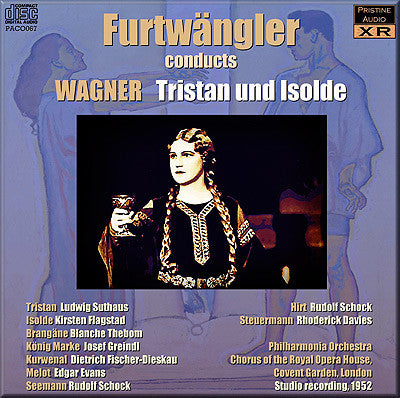
This album is included in the following sets:
This set contains the following albums:
- Producer's Note
- Full Cast Listing
- Cover Art
Furtwängler's legendary Tristan and Isolde
Possibly its finest recording - new 32-bit XR remaster
This recording surely stands as one of the first truly great opera recordings of the era of tape recording - at last Furtwängler was free in the studio from the stifling requirements of 4-minute 78rpm sides, and what a fabulous result he and the EMI engineers made with this opportunity. My role here has been chiefly to clean up some of the murk and noise present in the original, and to extend both the top end and very deep bass. I was also able to address some pitch anololies previously ignored or undetected, most notably the first tape reel of Act 2, which has been heard quite a bit sharp (until now) for nearly 60 years...
Andrew Rose
-
WAGNER Tristan und Isolde
Chorus of the Royal Opera House, Covent Garden
Philharmonia Orchestra
conductor Wilhelm Furtwängler
Recording producer: Walter Legge
Recording Engineer: Douglas Larter
Recorded 10-21 & 23 June 1952, Kingsway Hall, London
Downloads include full score and libretto
CAST
Tristan Ludwig Suthaus
Isolde Kirsten Flagstad
Brangäne Blanche Thebom
König Marke Josef Greindl
Kurwenal Dietrich Fischer-Dieskau
Melot Edgar Evans
Seemann Rudolf Schock
Hirt Rudolf Schock
Steuermann Rhoderick Davies
Fanfare Review
The orchestral colors are richer, the voices bloom more, and the whole is more satisfying than it has ever been
In Fanfare 28:1 I reviewed two reissues of this 1952 HMV recording,
one on EMI, the other on Naxos. I noted that like the Callas Tosca,
since it was first issued this has been defined as a classic of the
recording industry by just about every commentator who has written about
it. It is, quite simply, one of the greatest Wagner performances ever
preserved on disc. I won’t take valuable Fanfare space by repeating what
I said there, other than to note again the greatness of Furtwängler’s
conducting here. Every single phrase is connected to what precedes it
and what follows it. Although the phrasing is supple, and there are many
subtle variations of tempo, everything is perfectly prepared. The music
breathes, breathes in a way that is so natural that we are ultimately
unaware of the act of performance, and aware only of Wagner’s great
achievement. Every aspect of the conductor’s craft and art is present
and is applied to this whole—color, balance, tempo, texture,
chord-voicing, shaping, articulation—all of this and more are sewn
together to make this miracle of a performance. Add Kirstin Flagstad’s
exalted Isolde, Ludwig Suthaus’s richly sung (and often underrated)
Tristan, and fine performances by Blanche Thebom, Dietrich
Fischer-Dieskau, and Josef Greindl, and you have a recording that merits
the almost universal praise it has garnered.
The real question
for collectors is whether this Pristine transfer is significantly
superior to the earlier ones. I had praise for both EMI’s and Naxos’s
versions, giving a very slight edge to the Naxos transfer by Mark
Obert-Thorn. I was not expecting a meaningful difference in Andrew
Rose’s effort for Pristine, but in fact it is enough of an improvement
to warrant its purchase by any serious collector. In addition to
listening to it all the way through, I did a number of spot A-B
comparisons to the EMI and Naxos. It seems to me that Rose has managed
to come up with a sound picture that is fuller at both the upper and
lower extremes of frequency, without ever turning the sound harsh. It is
the bass that is particularly impressive here—never boomy, but
satisfyingly solid with an impact missing until now. The orchestral
colors are richer, the voices bloom more, and the whole is more
satisfying than it has ever been. I heard the ambient stereo version,
but assume the monaural version that Pristine also issues is of equal
quality. Pristine’s ambient stereo bears no relation to the
pseudo-stereo that the record companies tried to peddle in the 1970s,
but instead manages to create just a bit more of a sense of space around
the sound. Of course Pristine’s version is also available as a FLAC
download from its website.
There can be little doubt that this
Furtwängler-led Tristan recording belongs in the Classical Hall of Fame,
and Pristine Audio’s stunning restoration gives me good reason to put
it there.
Henry Fogel
This article originally appeared in Issue 35:5 (May/June 2012) of Fanfare Magazine.

